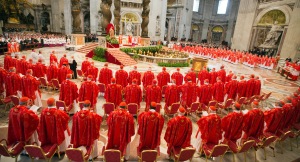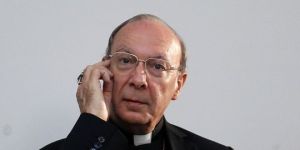 After a few days of rumours, it was confirmed today: Francis’ first class of cardinals is to be created on 22 February 2014, the Feast of the Chair of St. Peter. This places it a year and four days after Pope Benedict XVI next-to-last consistory which saw, among others, the creation of Cardinal Wim Eijk.
After a few days of rumours, it was confirmed today: Francis’ first class of cardinals is to be created on 22 February 2014, the Feast of the Chair of St. Peter. This places it a year and four days after Pope Benedict XVI next-to-last consistory which saw, among others, the creation of Cardinal Wim Eijk.
As February 2014 dawns, there will be 106 electors in the College of Cardinals, members who can vote in a conclave and also hold seats in the various dicasteries of the Curia. That is 14 below the flexible maximum number of 120, so Pope Francis could create as many as 14 new voting cardinals, which is a pretty standard number for a consistory. Added to that me be a number of non-voting cardinals, as Benedict XVI did in five of his six consistories. Likely candidates seem to be Archbishop Gerhard Ludwig Müller, Prefect of the Congregation for the Doctrine of the Faith; Archbishop Beniamino Stella, Prefect of the Congregation for the Clergy; Archbishop Vincenzo Paglia, President of the Pontifical Council for the Family; and of course Archbishop Pietro Parolin, the Secretary of State.
But that’s just in the Curia. As to what diocesan bishops and archbishops may be created cardinals, the field seems to be wide open. Pope Francis most likely does not feel bound by the traditional cardinalatial sees, but much more by the person of a future cardinal. Coupled with his focus on the poor, we should perhaps not be surprised if a fair number of the new cardinals come from South America, Africa and Asia.
 In the Low Countries, the eyes are of course on Archbishop André-Joseph Léonard, the great archbishop of Brussels. If elevated to the College of Cardinals, he would be the eight in a line of cardinals which began with Cardinal Engelbert Sterckx, created by Pope Gregory XVI in 1838.
In the Low Countries, the eyes are of course on Archbishop André-Joseph Léonard, the great archbishop of Brussels. If elevated to the College of Cardinals, he would be the eight in a line of cardinals which began with Cardinal Engelbert Sterckx, created by Pope Gregory XVI in 1838.
Regarding other parts of the globe, the great guessing game is once more gearing up, and here is my tentative attempt at participating in it. The Holy Father may wish to focus especially on the aforementioned three continents of South America, Africa and Asia (the latter two notoriously underrepresented in the College of Cardinals which, it must be said, is not intended to be a representative body. For Pope Francis however, representation may be desirable) as part of the continuing reform of both the College of Cardinals and the Roman Curia. But, as far as the latter is concerned, the most effective first step is probably found in the field of appointments, and not in new cardinals yet.
Photo credit: [1] Michael Kappeler/DPA/Abaca Press/MCT
